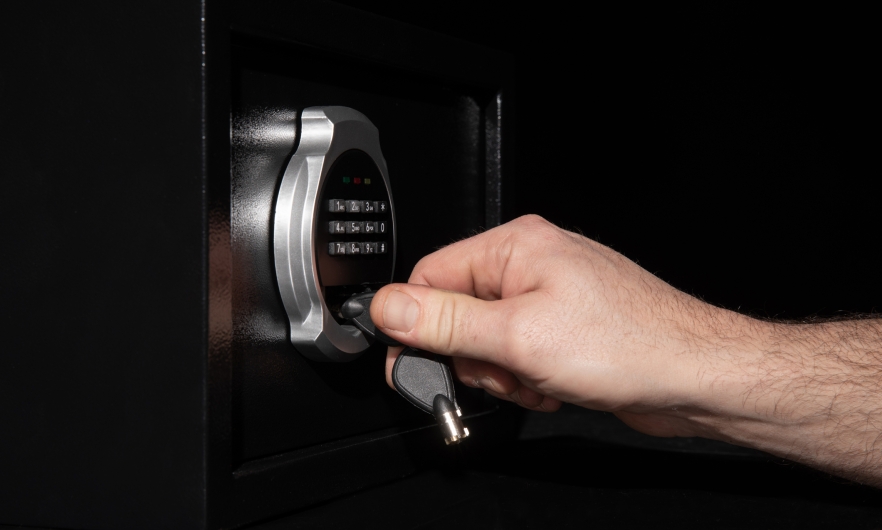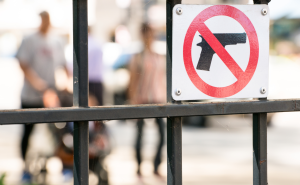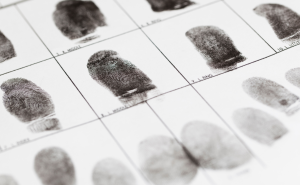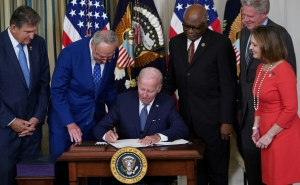What The Conviction of a Parent of a School Shooter Could Mean

The manslaughter conviction of Jennifer Crumbley, whose son shot and killed four students at his school, is unprecedented. But will it be a watershed moment for gun violence in schools?
In this Q&A, adapted from the March 1 episode of Public Health On Call, Tim Carey, JD, a law and policy adviser at the Johns Hopkins Center for Gun Violence Solutions, talks about the unique facts of this case, its larger implications, and why child access prevention laws are an important part of the conversation.
Tell us about this unprecedented case.
Never before in the history of this country has a parent been charged for the offenses committed by their child in a school shooting, which is saying something in America, where we have the highest rate of school shootings among peer nations.
To get a sense of why this case is so important, let's look at the facts. There was a hearing in a Michigan criminal court in February 2024 where [Jennifer Crumbley] the mother of the Oxford High School shooter was tried and found guilty on four counts of manslaughter, one for each child that her son murdered in the Oxford High School shooting on November 30, 2021. The rationale behind these charges was that she was so negligent, so reckless in how she handled firearms, how she allowed her child to have access to firearms, and how she failed to see or act upon all the warning signs that led up to the shooting, that the court actually found her criminally liable.
To understand the gravity of how the court reached this finding, we should look back to the shooting itself. On that day, school officials brought the shooter's parents into school to discuss their son's mental health and well-being after he depicted a gun and bloodshed on a school assignment. His teachers were very worried and called his parents that same day, but the parents opted to not take their child home. Hours later, the child began shooting fellow students and school staff with a gun that he had in his backpack that his parents had bought for him a few days before.
This child [Ethan Crumbley] killed four students and wounded seven others, including a teacher. He was 15 at the time he committed this crime and was later found guilty of four counts of first-degree murder in his own criminal case. He was sentenced to life in prison without parole last year.
So his mother gifted him this gun at 15 years old?
Yes. In Michigan, youth under age 18—can possess guns legally in certain circumstances. Typically they revolve around hunting, being at a shooting range, or otherwise being under the supervision of someone older than 18. In this case, though it is technically legal in Michigan for this child to possess the gun, the context in which the child used the gun was not legal.
To me, these facts are egregious, and this seems like the perfect case to find the parent responsible. Do you think there will be other cases where the parent is found liable?
It's definitely been buzzing around in news cycles recently, but was this case a watershed moment for other parents to be held criminally liable for the actions of their children? It's unlikely, in large part because of just how extreme this particular case was. The parents gave their troubled child a firearm days before the shooting and ignored flagrant warning signs of violence that were clearly evident to the school to the point where they brought the parents in.
The facts are so clear in this case that I could see readily how a jury would find the parents’ conduct to be worthy of criminal negligence and recklessness. The majority of school shooting cases aren’t this clear cut—it’s sometimes unclear how the child got access to the gun or how visible the warning signs were.
I think this case is very important in terms of accountability, and it’s bringing attention to the critical issue of youth firearm access. But there's still much to be done in terms of mitigating the risks of further gun violence in schools, and I don't think this case will solve all of that.
Ethan Crumbley's father is also scheduled to be tried for the same crimes.
Yes, that's right. Due to the unprecedented nature of the rulings, we expect to see appeals, which could take years. But at least at this moment, it has shown a new avenue, a different treatment toward school shootings and accountability.
About three-quarters of school shooters in recent years got their guns at home. What does this mean in terms of liability?
Comprehensive investigations of school shootings between 1999 and 2018 found that around 80% of school shooters obtained the guns they used in the shooting from their home or from the home of a friend, which implies that unsecured, readily accessible firearms are part of what enables youth to harm themselves and others with guns.
This brings us to evidence-based policy that the Center for Gun Violence Solutions has advocated for in many states: safe storage laws.
Safe storage laws provide clear guidance for how firearms should be stored: in a locked container, unloaded, and otherwise inaccessible to people not authorized to use them—largely minors and children, but also home invaders, friends, guests—essentially anyone who doesn't own the gun.
Among the safe storage laws is a subsection called child access prevention (CAP) laws. CAP laws require that there be safe storage of firearms, and if a child accesses those firearms, there are additional levels of criminal penalties in most cases or civil liability in some states.
In light of what happened in Michigan, I understand you testified before state legislators about safe storage laws?
Yes. Michigan had a landmark legislative session in 2023 regarding firearms laws and policies. One critical policy they introduced and later passed was a CAP law that was in large part inspired by this case, as well as by seeing this law being used and implemented across the country.
CDC data from the past several years has shown that firearms were the leading cause of death for youth ages 1–19 in the U.S. in 2020, 2021, and 2022. And though we're still analyzing data from 2023, it's unfortunately expected for that trend to remain the same.
There's been a lot more focus on how to prevent youth from accessing firearms and using them to harm themselves or others, and CAP laws have shown to be an effective means of doing so.
We almost never see charges against the parents in the case of school shootings. Is that because the laws aren't in place, or is it because prosecutors don't choose to pursue the parents?
Part of the issue, and why we see fewer court hearings on these cases in particular, is that they are tragedies. Often in these cases, the child takes their own life, which can be painful. For prosecutors, sometimes it's difficult to imagine trying a parent who is mourning the loss of their child. However, this case was different. The negligence and recklessness on the part of the parents in the Oxford High School shooting case are at an entirely different level than the majority of school shooting cases.
But still, there's a general discomfort or unwillingness to bring charges in these cases, if the facts are even clear enough to bring a case at all. This is why instead of applying punitive measures after the fact, preventative and educational measures such as CAP laws help put parents on notice about how firearms should be safely stored. It also establishes the gravity of what it could mean if a child were to access these guns and makes it less likely that youth will access them and use them.
So, even though the case in Michigan is unique, it does open parents’ eyes to what could happen if they aren't more careful.
Exactly. This is a tragic situation, but it does at least raise awareness that this is a serious issue.
But for his [Ethan Crumbley] parents buying him a gun, he would not have had one. But for parents leaving their firearms unlocked, loaded, and in readily accessible places, a child would not have been able to get them and use them to commit a shooting. Again, a lot of our focus here is on prevention: how we can see the risks in front of us, calculate the measures, and then try to find ways to mitigate them. And this is where CAP laws really shine.
Note: Since this podcast was recorded, a man in Michigan became the first person to be charged under the state’s new firearms storage law. The law requires gun owners to store firearms unloaded and secured with a locking device or in a lockbox if a minor lives at or is likely to visit their property.
Stephanie Desmon is the co-host of the Public Health On Call podcast. She is the director of public relations and communications for the Johns Hopkins Center for Communication Programs, the largest center at the Johns Hopkins Bloomberg School of Public Health.





